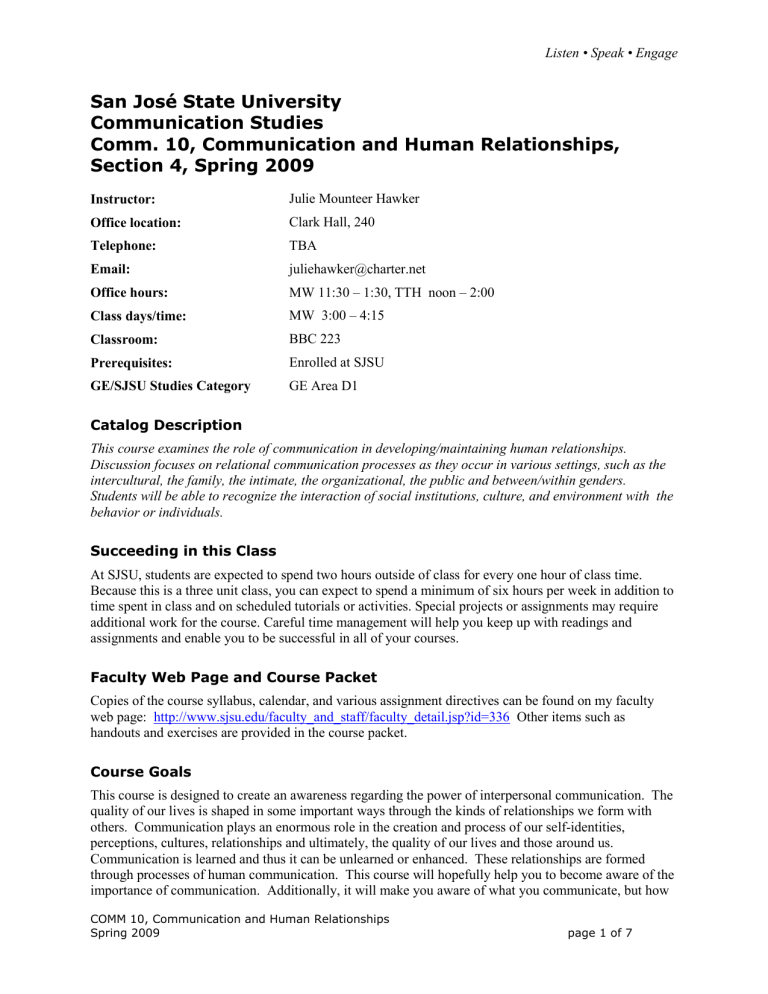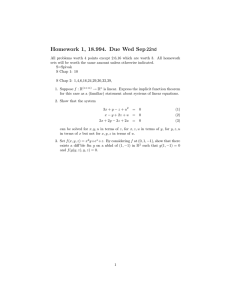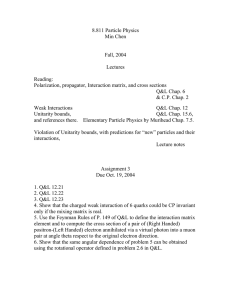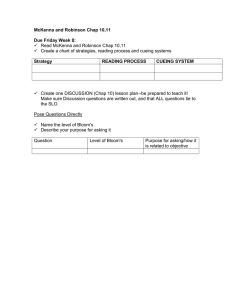San José State University Communication Studies Comm. 10, Communication and Human Relationships,

Listen • Speak • Engage
San José State University
Communication Studies
Comm. 10, Communication and Human Relationships,
Section 4, Spring 2009
Instructor:
Office location:
Telephone:
Email:
Office hours:
Class days/time:
Classroom:
Prerequisites:
GE/SJSU Studies Category
Julie Mounteer Hawker
Clark Hall, 240
TBA juliehawker@charter.net
MW 11:30 – 1:30, TTH noon – 2:00
MW 3:00 – 4:15
BBC 223
Enrolled at SJSU
GE Area D1
Catalog Description
This course examines the role of communication in developing/maintaining human relationships.
Discussion focuses on relational communication processes as they occur in various settings, such as the intercultural, the family, the intimate, the organizational, the public and between/within genders.
Students will be able to recognize the interaction of social institutions, culture, and environment with the behavior or individuals.
Succeeding in this Class
At SJSU, students are expected to spend two hours outside of class for every one hour of class time.
Because this is a three unit class, you can expect to spend a minimum of six hours per week in addition to time spent in class and on scheduled tutorials or activities. Special projects or assignments may require additional work for the course. Careful time management will help you keep up with readings and assignments and enable you to be successful in all of your courses.
Faculty Web Page and Course Packet
Copies of the course syllabus, calendar, and various assignment directives can be found on my faculty web page: http://www.sjsu.edu/faculty_and_staff/faculty_detail.jsp?id=336 Other items such as handouts and exercises are provided in the course packet.
Course Goals
This course is designed to create an awareness regarding the power of interpersonal communication. The quality of our lives is shaped in some important ways through the kinds of relationships we form with others. Communication plays an enormous role in the creation and process of our self-identities, perceptions, cultures, relationships and ultimately, the quality of our lives and those around us.
Communication is learned and thus it can be unlearned or enhanced. These relationships are formed through processes of human communication. This course will hopefully help you to become aware of the importance of communication. Additionally, it will make you aware of what you communicate, but how
COMM 10, Communication and Human Relationships
Spring 2009 page 1 of 7
Listen • Speak • Engage you do it. You can use the knowledge and insight gained in this course to help you communicate more effectively in developing and managing your own social relationships.
Course Learning Objectives
After successfully completing this course, you will:
LO1.
be able to identify and analyze the social dimension of society as a context for human life, the processes of social change and social continuity, the role of human agency in those social processes, and the forces that engender social cohesion and fragmentation.
LO2.
be able to place contemporary developments in cultural, historical, environmental, and spatial contexts.
LO3.
be able to identify the dynamics of ethnic, cultural, gender/sexual, age-based, class, regional, national, transnational, and global identities and the similarities, differences, linkage, and interactions between them.
LO4.
be able to evaluate social science information, draw on different points of view, and formulate applications appropriate to contemporary social issues.
LO5.
be able to recognize the interaction of social institutions, culture, and environment with the behavior of individuals.
LO6.
examine the idea that our social worlds are created through communication processes, and that people can recreate their relationships by communicating differently.
Required Texts and Readings
Textbook
Wood, J.T. (latest ed.). Interpersonal Communication: Everyday Encounters.
Belmont, CA: Thomson
Wadsworth.
Other equipment requirements (if needed)
Blank Journal
Library Liaison
Questions involving library research and materials can be found in the MLK library, second floor.
Classroom Protocol
1.
I strongly encourage class participation and interaction in this course. Your contributions and involvement are an essential part of the learning process. To help facilitate participation, much of our in-class activities and exercises will be conducted in small groups. At the end of each class period, you will turn in the class work for points.
2.
This is a diverse class, so you will hear opinions that you don’t always agree with. A respectful, mature attitude is needed during class.
3.
Email: Don’t miss class and then email me expecting the low-down on the lecture that day. Get notes from a fellow student or see me during my office hours. Please don’t email me your outline or paper in advance and ask me “to look it over.” My office hours serve that purpose.
4.
Save all graded assignments until the end of the semester in case of a grade dispute. If you claim to have completed an assignment, you will have the burden of proof in showing it to me.
COMM 10, Communication and Human Relationships
Spring 2009 page 2 of 7
Listen • Speak • Engage
5.
Don’t come to me at the end of the semester asking if you can make up missing assignments. It’s your job to keep track of them. If you have questions, we can conference together during the semester.
Dropping and Adding
You are responsible for understanding the policies and procedures about add/drops, academic renewal, and similar topics found at http://sa.sjsu.edu/student_conduct.
Assignments and Grading Policy
Note: Getting a C- in this course does not qualify you for G.E. credit. Policy S99-6 states that you can pass this course with a C-, but it won’t earn you G.E. credit.
1.
See my faculty web page and course packet for details on assignments.
2.
Failure to show up on days you are presenting will hurt your overall grade.
3.
All work must be typed and of collegiate standards. That means spell checked, proofed for grammatical errors and appropriately referenced.
4.
In class assignments and activities cannot be made up.
5.
I don’t allow extra credit.
6.
I allow one revision on one paper to be turned in to me one week after you get your graded paper back. The revisions must be significant enough to warrant a grade change.
7.
All papers are required to go through Turnitin.com before turning them into me. The receipt needs to be attached. The URL: http://turnitin.com
8.
Any late papers will be dropped one letter grade for every two days they are late. If you are sick, any late work will be accepted the following class period it is due, provided you have documented evidence in terms of illness or emergencies. Let me know before class, not after if you are sick or can’t turn in an assignment. It’s too easy to miss an assignment/class and claim sickness. Band or athletic events should be make known to me at the beginning of the semester.
9.
Don’t email me papers, I expect the hardcopy at the beginning of the class period it is due.
Assignments
Music Activity and Presentation (L04), (Outline is at least 500 words) 35 Points
Self, Society, and Media Critique Paper (L01 – 5) (2,000 words) 50
Intercultural Interview Paper (L01 – 5) (2,000 words) 50
Relationship Development Paper (L01 – 5), (2,000 words) 50
Journals/In-class Activities (L02 – 5) 50
Midterm Exam (L01, L03) 50
Final Exam (L01, L03) 50
Total 335
COMM 10, Communication and Human Relationships
Spring 2009 page 3 of 7
Listen • Speak • Engage
The grading scale for each assignment and the final semester grade will follow a standard scale such that
90% of the total points equal an A- to an A”, 80-89% equals a “B- to a B+”, and so on. You can track your own grade as we progress throughout the semester.
University Policies
Academic integrity
You must be familiar with the University’s Academic Integrity Policy available at http://sa.sjsu.edu/student_conduct
. “Your own commitment to learning, as evidenced by your enrollment at San Jose State University and the University’s integrity policy, require you to be honest in all your academic course work. Faculty members are required to report all infractions to the office of Student
Conduct and Ethical development.”
I will not tolerate instances of academic dishonesty. Cheating on quizzes or plagiarism (presenting the work of another as your own, or the use of another person’s ideas without giving proper credit) will result in a failing grade and sanctions by the University. For this class, all assignments are to be completed by the individual student unless otherwise specified. “If you would like to include in your assignment any material you have submitted, or plan to submit for another class, please note that SJSU’s Academic
Policy F06-1 requires approval of instructors.”
Campus Policy in Compliance with the Americans with Disabilities Act
If you need course adaptations or accommodations because of a disability, or if you need to make special arrangements in case the building must be evacuated, please make an appointment with me as soon as possible, or see me during office hours. Presidential Directive 97-03 requires that students with disabilities requesting accommodations must register with the DRC (Disability Resource Center) to establish a record of their disability.
Student Technology Resources
Computer labs for student use are available in the new Academic Success Center located on the 1 st floor of Clark Hall and on the 2 nd floor of the Student Union. In addition, computers are available in the Martin
Luther King Library. The COMM Lab, located in Clark Hall 240, also has a few computers available for student use.
A wide variety of audio-visual equipment is available for student checkout from Media Services located in IRC 112. These items include digital and VHS camcorders, VHS and Beta video players, 16 mm, slide, overhead, DVD, CD, and audiotape players, sound systems, wireless microphones, screens and monitors.
COMM Lab
The COMM Lab is located in Clark Hall 240. Tutors for the lab are recruited from well-qualified communication studies graduate and upper division students. The Lab provides resources for enrichment and assistance for those enrolled in all Communication Studies classes. Lab hours vary by semester and are posted on the COMM Lab wiki available at commlab.pbwiki.com
. Support for the Lab is provided by enrollments in COMM
Learning Assistance Resource Center
The Learning Assistance Resource Center is designed to assist students in the development of their full academic potential and to motivate them to become self-directed learners. The center provides support services, such as skills assessment, individual or group tutorials, subject advising, learning assistance,
COMM 10, Communication and Human Relationships
Spring 2009 page 4 of 7
Listen • Speak • Engage summer academic preparation and basic skills development. The Learning Assistance Resource Center is located in Room 600 in the Student Services Center.
SJSU Writing Center
The SJSU Writing Center in Clark Hall 126 is staffed by professional instructors and upper-division or graduate-level writing specialists from each of the seven SJSU colleges. The writing specialists have met a rigorous GPA requirement, and they are well trained to assist all students at all levels within all disciplines to become better writers. More information available at http://www.sjsu.edu/writingcenter .
COMM 10, Communication and Human Relationships
Spring 2009 page 5 of 7
Listen • Speak • Engage
Comm. 10, Section 4, Communication and Human
Relationships, Spring 2009 Class Schedule
This calendar is tentative. Subject to change with fair notice or I will announce any changes in class or email.
Week Description
1 M 1/26 Course Introduction
W 1/28 Interpersonal Communication Defined
2 M 2/2 Interpersonal Communication Con’t.
W 2/4 Self Concept
3 M 2/9 Improving Self Concept
W 2/11 The Nature of Language
Reading
Buy Text
Chapter. 1
Chap. 1
Chap. 2
Chap. 2
Chap. 4
Chap. 4
Assignments
Assign Paper #1
4 M 2/16 Developing Verbal Clarity
W 2/18 Nonverbal Communication
5 M 2/23 Nonverbal Communication
Chap. 5
Chap. 5
Chap. 6
Paper #1, Self, Society,
Media due
W 2/25 The Listening Process
6 M 3/2 Learning to Listen
W 3/4 Midterm Review
7 M 3/9 Midterm Exam
W 3/11 Emotions and Communication
8 M 3/16 Emotions, Con’t.
W 3/18 Communication Climate
Spring Break 3/23 – 3/27
Chap. 6
Chap. 7
Chap. 7
Chap. 8
Assign Music Pres.
9 M 3/30 Music Activity Presentations
W 4/1 Music Presentations , Comm. Climate
10M 4/13 Conflict: Definition
W 4/15 Conflict: Values, Styles
11M 4/20 Climates and Conflict, Con’t.
W 4/22 Friendship In Our Lives
12M 4/27 Styles and Patterns In Friendship
W 4/29 Friendship, Con’t.
13M 5/4 Romantic Relationships
Chap. 8
Chap. 9
Chap. 9
Chap. 9
Chap. 10
Chap. 10
Chap. 10
Chap. 11
Assign Intercultural Paper
Have fun, but don’t forget to prepare for your music presentations.
Assign Relationship Paper
Paper #2 Intercultural
Paper due
COMM 10, Communication and Human Relationships
Spring 2009 page 6 of 7
W 5/6 Challenges In Romance
14M 5/11 Perception
W 5/13 Course Wrap-up, Review For Final
Final Exam: Wed., May 20 th , 12:15 – 2:30
Chap. 11
Chap. 3
Listen • Speak • Engage
Paper #3 Relationship
Paper due
COMM 10, Communication and Human Relationships
Spring 2009 page 7 of 7




